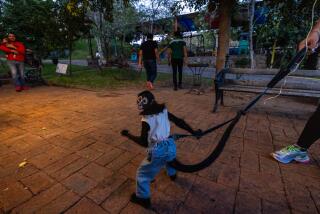Orinoco Crocodile Making a Comeback in Venezuela
- Share via
SAN FERNANDO DE APURE, Venezuela — Members of the Wild Crocodile Skiing Club used to water-ski fearlessly on the rivers of Venezuela’s Great Plains because their main nemesis, the Orinoco crocodile, was nearly extinct.
But now they’ve put their skis away because the massive reptiles are making a comeback. Conservationists are raising baby Orinocos in captivity and releasing them into the wild to try to bring back the species.
“This idea ought to be scrapped,” says Luis Henrique Moser, a buffalo rancher and former ski club member who fears that crocodiles will emerge from the river near his house and eat his 3-year-old daughter.
But conservationists say the breeding program is the only hope for saving one of the last surviving species from the dinosaur age.
“We’ve avoided its extinction,” says conservationist Pedro Azuaje, standing on a metal platform above a fenced-in lagoon where 20 crocodiles, each weighing up to 880 pounds, wait languidly for the bloody hunks of horse meat that workers toss them.
He and other conservationists play down the fears of local residents, saying attacks by Orinoco crocodiles are rare.
“These are not bloodthirsty animals that are going out and killing people left and right,” said John Thorbjarnarson, an expert on crocodiles at the New York City-based Wildlife Conservation Society, which participates in the program in Venezuela.
San Fernando car mechanic Berto Jimenez and his neighbor Berta Perez say that, for years, they kept the reptiles as pets in small fenced pools in their yards. Jimenez claims that one, named Pancho, wandered around his shop and house, climbed into his bed and occasionally sneaked out onto the street.
But the crocodile also ate Jimenez’s dog. He finally got rid of it after it sank its teeth into his teenage daughter’s legs. She needed 20 stitches.
The Orinoco crocodile used to reign supreme in the Orinoco River basin in eastern Venezuela and the wildlife-rich plains in southern Venezuela.
Just 70 years ago, there were more than 1 million Orinocos, Thorbjarnarson says. Growing up to 23 feet long and weighing as much as 2,200 pounds, they are among the world’s largest crocodiles and are capable of eating full-grown humans. They can live up to 70 years.
Today, less than 1,000 adult Orinoco crocodiles are left in Venezuela and even fewer in neighboring Colombia, the only other country where the species is found. Most were killed by hunters who sold their highly prized skins to make purses, belts and shoes.
Crocodiles as a group are endangered, with five of the 22 species close to extinction.
Private-sector conservationists and university researchers have raised and released about 2,000 baby Orinocos into the wild since 1990.
At Puerto Miranda, workers obtained adult crocodiles from homes and zoos and placed them in the lagoons. When the females lay eggs in holes they dig on the shorelines, workers remove them and put them in an indoor incubator of sand and hot light bulbs that simulate conditions on a tropical shoreline.
After the eggs hatch about 80 days later, the crocodiles are raised in pens near the lagoons for a year, and then freed.
The process greatly improves their rates of survival because most baby crocodiles are killed in the wild by predators such as herons, storks, lizards and raccoons.
Thorbjarnarson says researchers have seen signs that the program is working: Last year and this year they found nests likely made by the first crocodiles released.
He says the crocodiles should pose little danger since they are freed in remote wildlife reserves.
If the population reaches about 5,000 and the Orinoco crocodile is no longer in danger of extinction, the government could allow legal capture and sale of the animals to keep the numbers from getting too high, Azuaje says.
Moser isn’t convinced. He says he was on his motorboat going down a river a few years ago when a huge Orinoco crocodile surfaced. He gave up water-skiing after that.
More to Read
Sign up for Essential California
The most important California stories and recommendations in your inbox every morning.
You may occasionally receive promotional content from the Los Angeles Times.













